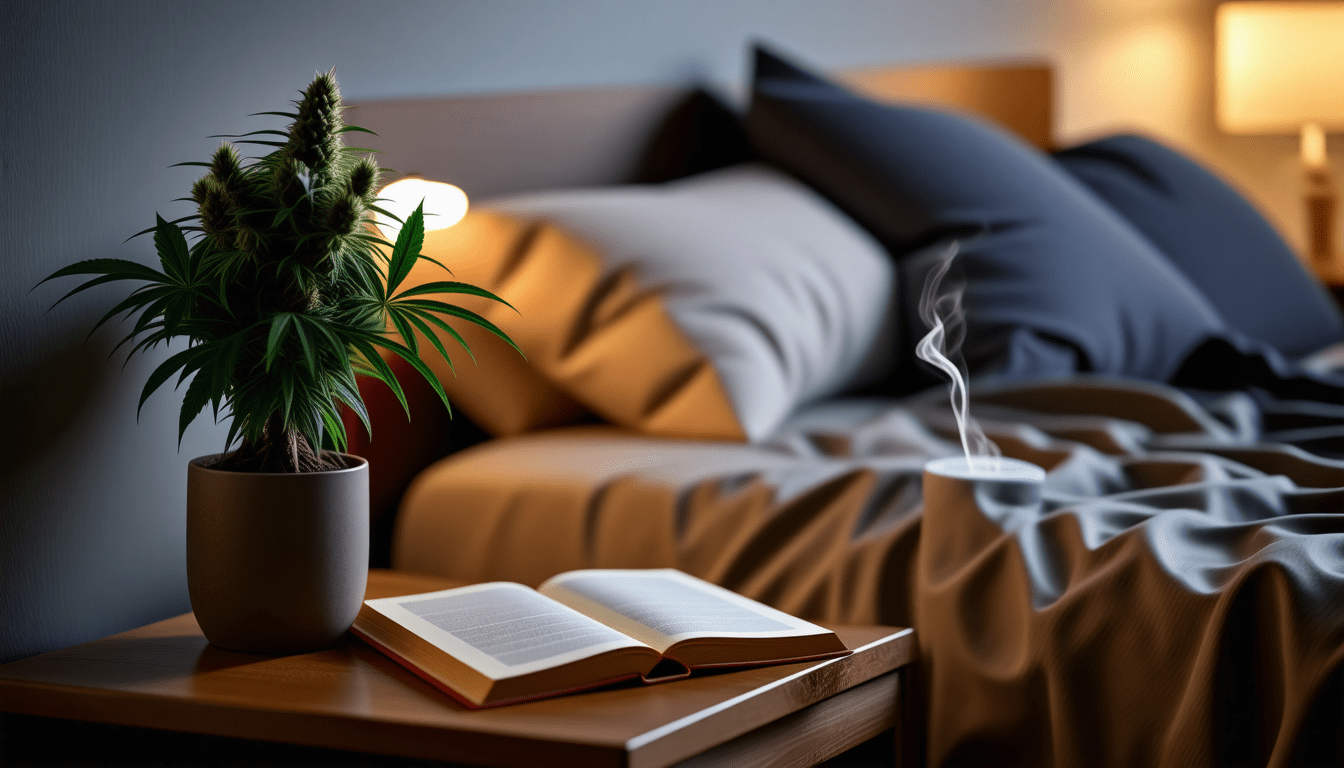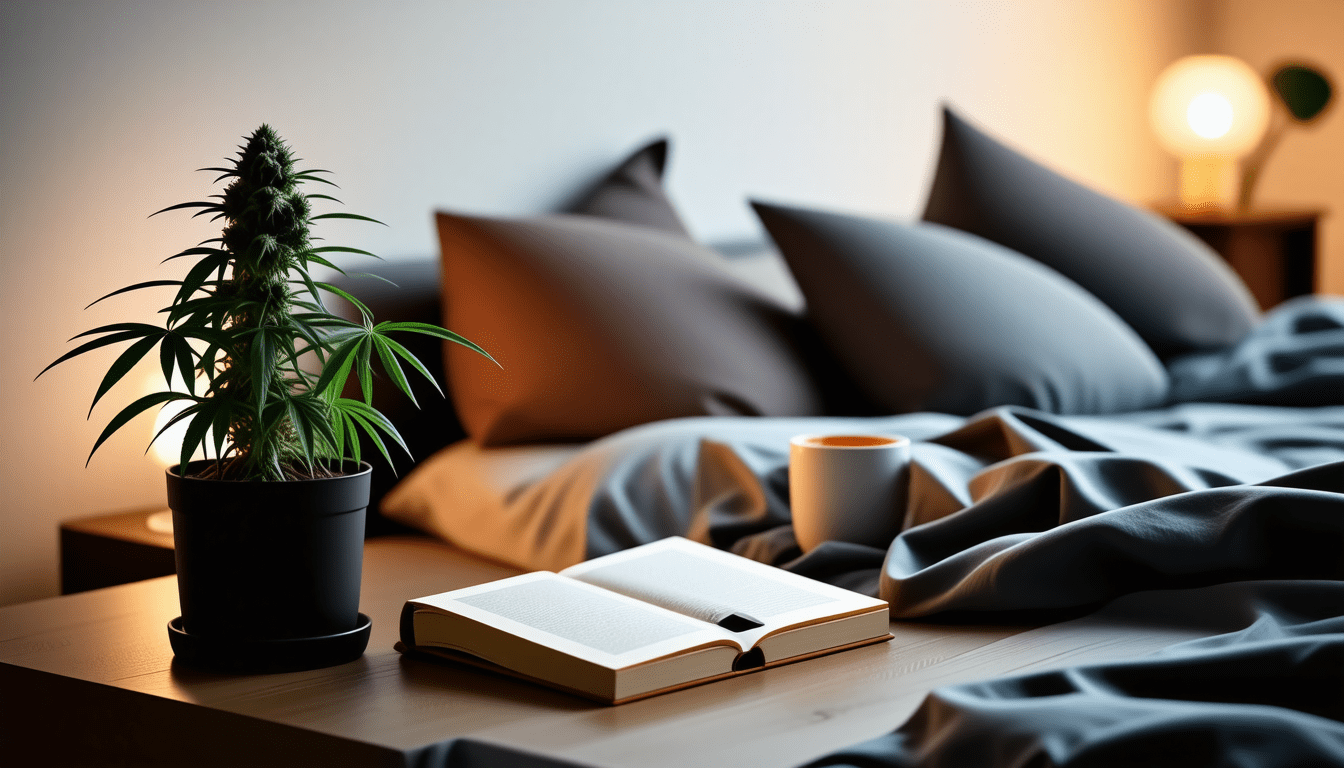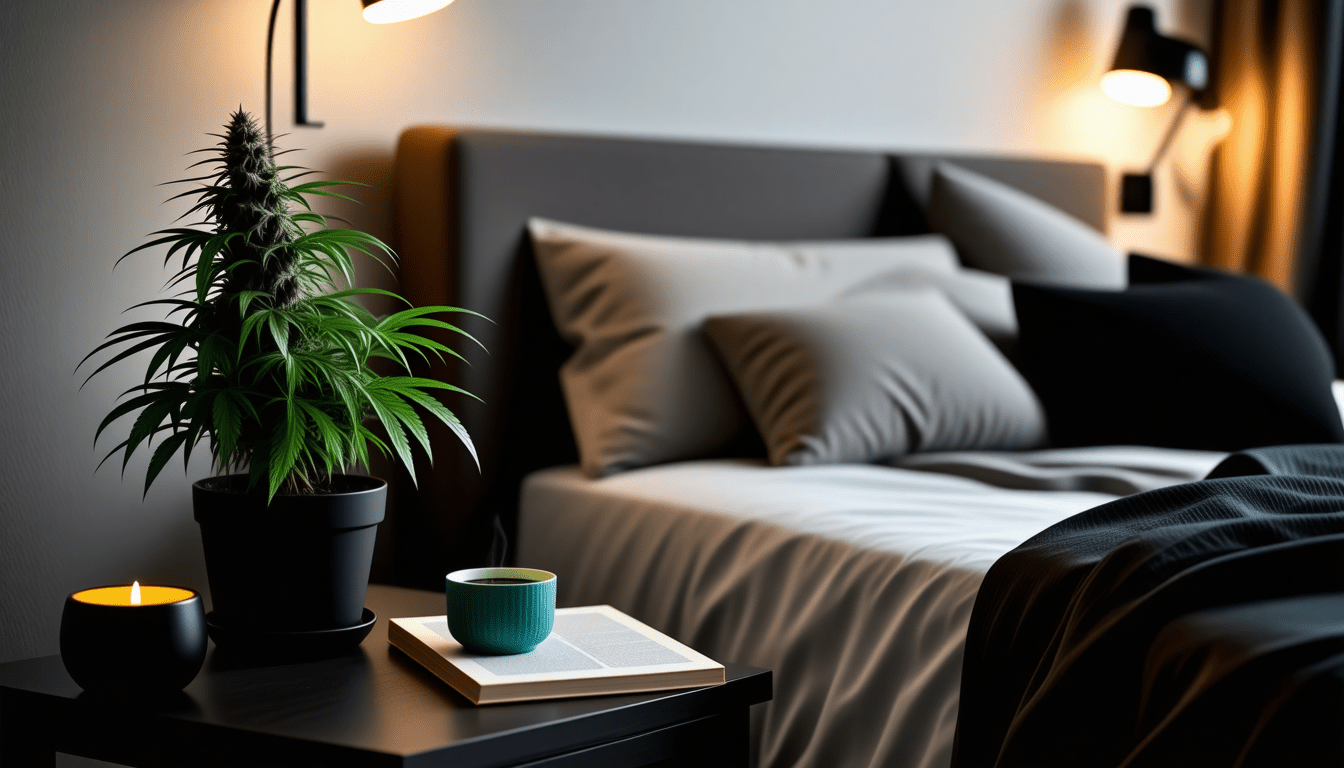How cannabis can help with sleep disorders
|
IN BRIEF
|
Many individuals struggle with sleep disorders, leading to a pursuit of effective solutions. Among the various remedies available, cannabis has emerged as a notable contender, capturing the attention of both the public and healthcare professionals alike. Its potential benefits for enhancing sleep quality and promoting deeper slumber have sparked interest and research. Recent studies suggest that cannabis, particularly THC and CBD, may play a significant role in alleviating insomnia and other sleep-related issues by interacting with specific receptors in the brain. As more people explore the therapeutic possibilities of cannabis, understanding its implications for sleep disorders is crucial in determining whether it is a viable option for those seeking relief.

Sleep disorders affect millions of people globally, leading to a range of health issues, including anxiety, depression, and impaired cognitive function. There is a growing interest in the use of cannabis as a potential solution for these problems. With research indicating that cannabis may promote better sleep by interacting with the body’s endocannabinoid system, exploring its therapeutic benefits could offer new hope for those struggling with insomnia and other sleep disturbances. This article delves into how cannabis can help with sleep, discussing its mechanisms, effects, and considerations.
The Science Behind Cannabis and Sleep
Research suggests that cannabis interacts with specific receptors in the brain, sending signals that promote sleep while mitigating arousal responses. This interaction primarily involves the compounds THC and CBD, both of which have been shown to play roles in enhancing sleep quality. In particular, THC may help individuals fall asleep faster and increase the duration of deep sleep, making it potentially beneficial for those experiencing insomnia or sleep apnea.
The Role of THC in Sleep Improvement
THC, or tetrahydrocannabinol, is the main psychoactive component in cannabis. Studies have shown that it can significantly reduce the time it takes to fall asleep and enhance the overall sleep experience. By increasing deep sleep and shortening the rapid eye movement (REM) phase, THC may provide a deeper and more restful sleep. However, it’s essential to acknowledge that while many users report positive effects, the evidence remains limited, and more extensive research is needed to understand its efficacy fully.
Understanding CBD’s Influence
Unlike THC, CBD does not produce psychoactive effects, which makes it an appealing alternative for individuals looking for sleep aid without the high. Preliminary research indicates that CBD may help alleviate anxiety and promote relaxation, factors that can significantly improve sleep quality. Moreover, some studies suggest that it may influence sleep cycles positively, although the mechanisms behind these effects require further investigation. The soothing properties of CBD make it a popular choice for those seeking natural remedies for sleep disorders.
Evidence Supporting Cannabis Use for Sleep Disorders
While anecdotal evidence from individuals who use cannabis for sleep is abundant, systematic studies are still in the early stages. Surveys and smaller studies have shown significant interest in cannabis as a sleep aid, with many users reporting improved sleep quality and duration. Emerging research highlights the potential of cannabis products to alleviate insomnia symptoms, although it is crucial to approach these findings with care, as the clinical evidence continues to evolve.
Potential Risks and Considerations
Despite the potential benefits of cannabis for sleep disorders, it’s essential to consider the possible risks involved. The use of cannabis might lead to dependency and impaired cognitive function in some individuals. Additionally, the quality and composition of cannabis products can vary greatly, causing unpredictable effects. As such, consulting with a healthcare professional before starting any cannabis regimen, particularly in relation to sleep disorders, is highly recommended.
As the exploration of cannabis continues to evolve, more individuals are turning towards this natural remedy to address sleep disturbances. While the potential benefits of cannabis such as THC and CBD are promising, it is crucial to remain informed about the risks. A thorough understanding of how cannabis affects sleep can empower users to make informed choices and potentially improve their overall sleep health.
Comparison of Cannabis Types for Sleep Disorders
| Cannabis Type | Effect on Sleep Disorders |
| Indica | Typically known for its relaxing effects, it may promote deep sleep and reduce insomnia symptoms. |
| Sativa | More energizing; may not be ideal for sleep but beneficial for anxiety reduction prior to sleep. |
| THC | Can help users fall asleep faster and stay in deep sleep longer. |
| CBD | Has calming effects that may decrease anxiety and improve overall sleep quality. |
| Dronabinol | A synthetic form of THC that may aid in obstructive sleep apnea. |
| Edibles | Provide a longer-lasting effect but may lead to grogginess if dosage is too high. |
| Full-spectrum Products | Contain a variety of cannabinoids that work synergistically for better sleep outcomes. |

Many individuals struggle with sleep disorders, and traditional solutions may not always provide the relief needed. Growing evidence suggests that cannabis might offer beneficial effects for those seeking to improve their sleep quality. In this article, we explore how cannabis interacts with the body to help alleviate sleep-related issues, while also considering some important factors like dosage and individual response.
The Science Behind Cannabis and Sleep
Cannabis contains various compounds, but two of the most prominent are tetrahydrocannabinol (THC) and cannabidiol (CBD). THC is known for its psychoactive properties and has been reported to help individuals fall asleep faster by promoting a feeling of relaxation. Research indicates that cannabis binds to specific receptors in the brain, effectively sending sleep-promoting messages and reducing arousal, thereby encouraging deep, restorative sleep.
Benefits of Using Cannabis for Sleep Disorders
Individuals suffering from insomnia and other sleep disturbances may find relief through cannabis use. Evidence suggests that THC not only helps people fall asleep more quickly but also extends the duration of deep sleep. This can be particularly advantageous for those struggling with sleep continuity and quality. Additionally, some early studies on dronabinol, a synthetic form of THC, indicate potential benefits for conditions such as obstructive sleep apnea.
Understanding CBD’s Role in Sleep Improvement
While THC is often the focus, CBD also garners attention for its possible benefits when it comes to sleep. Unlike THC, CBD does not produce a high, making it an appealing option for those looking to relieve sleep disorders without the psychoactive effects. Preliminary research suggests that CBD may help alleviate insomnia and reduce anxiety, thereby improving overall sleep quality. Many people have reported feeling more relaxed after using CBD, reinforcing its potential as a natural aid for better sleep.
Considerations and Cautions
It’s essential to acknowledge that the evidence supporting cannabis use for sleep is still evolving. While some users experience significant improvements in their sleep patterns, results can vary widely based on individual biology, the type of cannabis product used, and dosage. Additionally, some concerns have been raised regarding the quality and safety of cannabis products, as seen in recent reports where certain products were recalled due to contamination issues. Therefore, it’s important to choose reliable sources and stay informed about the products being used.
Public Perception and Research Landscape
As we navigate the conversation around cannabis, public perception is significantly influenced by social media and ongoing research. There is a growing interest in understanding how cannabis can be a viable solution for holistic health and wellness. Reports have surfaced highlighting the similarities between federally approved cannabis and commercial varieties, yet skepticism remains among experts regarding its efficacy. Continuous research and open discussions are vital for clearing up misconceptions and establishing credible guidelines for the use of cannabis in treating sleep disorders.
Final Thoughts
With the increasing interest in the therapeutic benefits of cannabis, individuals facing challenges with sleep disorders may find it to be a promising option. As the research develops, it is crucial to remain informed and approach cannabis use with caution, ultimately prioritizing safety and well-being. For those interested in exploring the potential of cannabis, understanding its effects on sleep is a key component in making an informed decision.
For more information on the safety of cannabis products, visit Maine’s Cannabis Products Recall, or learn about the research on cannabis at Study on Research Cannabis. Additionally, insights into cannabis legalization and health can be found at Legal Action on Cannabis Rescheduling and Wellness Through Cannabis. Engage with the conversation on Cannabis and Public Perception.
- Falling Asleep Faster: Cannabis can promote quicker sleep onset by reducing time taken to fall asleep.
- Enhanced Sleep Quality: Many users report experiencing deeper and more restful sleep cycles.
- Reduction of Nighttime Awakenings: Cannabis may help reduce the frequency of waking up during the night.
- Improvement in Insomnia Symptoms: Some studies suggest that THC can alleviate symptoms of insomnia.
- Managing Sleep Apnea: Early research indicates that cannabis, particularly dronabinol (synthetic THC), might aid obstructive sleep apnea.
- Balanced Sleep Patterns: Cannabis may help stabilize sleep patterns for those with irregular schedules.
- Relaxation and Stress Relief: The calming effects of cannabis can help ease anxiety, promoting a better sleep environment.
- Potential Synergy with Melatonin: Some evidence suggests that cannabis could enhance melatonin levels, contributing to better sleep.
Understanding Cannabis and Sleep Disorders
Cannabis has garnered attention for its potential to assist those suffering from sleep disorders. Research suggests that certain compounds within cannabis, particularly THC and CBD, may provide sleep benefits by interacting with the body’s endocannabinoid system. This interaction could promote sleep by reducing anxiety, making it easier for individuals to both fall and stay asleep.
The Role of THC in Sleep Improvement
THC, the psychoactive component of cannabis, is believed to play a significant role in enhancing sleep quality. Studies indicate that THC can help individuals with insomnia fall asleep faster while also increasing the duration of deep sleep. This is crucial for restorative sleep, as deep sleep is essential for physical recovery and mental well-being.
Individuals suffering from chronic sleep disturbances may find that THC reduces the time it takes to drift off to sleep, allowing for a more restful night. However, it’s important to note that high doses of THC can sometimes lead to next-day grogginess, which may not be ideal for all users. Therefore, moderating intake may provide a balanced approach to harnessing its benefits.
CBD’s Contribution to Sleep Quality
CBD, another prominent cannabinoid, is often lauded for its potential anti-anxiety and calming effects. Unlike THC, CBD is non-psychoactive, making it an appealing option for those seeking relief without intoxication. Some evidence suggests that CBD may interact with receptors in the brain that regulate sleep patterns and anxiety, ultimately fostering a sense of calm conducive to better sleep.
Research has shown that individuals using CBD report a decrease in sleep disturbances and improved overall sleep quality. This makes CBD a valuable alternative for those who may be hesitant to use THC due to its psychoactive properties.
Combining Cannabinoids for Enhanced Effects
A combination of THC and CBD may yield a synergistic effect, enhancing the overall benefits for sleep. Many users report that a well-balanced ratio of both cannabinoids can alleviate symptoms of insomnia without compromising daytime functionality. However, it is crucial to start with lower doses and gradually increase, as individual responses can vary significantly.
Potential Risks and Considerations
While cannabis can have beneficial effects, it is essential to be aware of the potential risks. Regular use, especially of THC-heavy strains, may lead to dependency or tolerance, requiring users to consume higher amounts over time to achieve the same effects. Furthermore, the varying legality of cannabis across regions can pose accessibility challenges, and safety concerns, such as potential reactions or negative impacts on mental health, should be considered.
Consulting with a healthcare professional before beginning any cannabis regimen is advisable, particularly for individuals with pre-existing health conditions or those currently taking medications that may interact with cannabis.
Finding the Right Strain
Choosing the appropriate cannabis strain for sleep can significantly affect each individual’s experience. Indica strains are traditionally recommended for sleep due to their relaxing properties, while sativa strains are generally more invigorating. Users may need to experiment to find the strain that best suits their needs and promotes the optimal level of sedation without unwanted side effects.
In summary, cannabis shows promise as a tool for managing sleep disorders. Through the combined effects of THC and CBD, many individuals may find relief from insomnia and improve their overall sleep quality. However, it is important to approach cannabis use with caution and seek professional advice tailored to individual health needs.


Post Comment